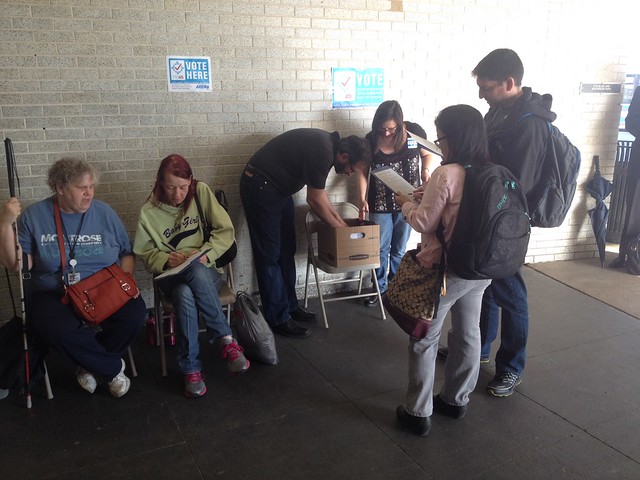For the second year in the row, voters passed over bicycle projects in the 45th Ward’s participatory budgeting election. But separately, a safety overhaul of Milwaukee Avenue, including protected bike lanes, may still be in the works for this Northwest Side district.
In 2013, ballot items included buffered bike lanes on Milwaukee and Lawrence, as well as on-street bike parking corrals at three locations, but none of these made the final cut. However, the Lawrence proposal, which called for upgrading conventional lanes on the street from Cicero to Long at a cost of $70,000, garnered enough votes last year to be included on the 2014 ballot.
When I talked to Alderman John Arena’s chief of staff Owen Brugh last month, he didn’t think bike corrals would be on the ballot this year. However, a new proposal to add corrals near the Irving Park/Cicero/Milwaukee intersection at a cost of $8,843, something the Six Corners Business Association has been pushing for, did appear on the ballot.
After voting wrapped up on Saturday, the bike projects lost once again. Residents opted to spend 55.1 percent of the $1 million budget on street repaving, leaving $449,000 for other projects. They voted to spend $240,750 to plant 450 trees throughout the ward, $100,000 for a new playground at Independence Park, and $150,000 for pigeon abatement at ten viaducts. View the full results here.
There wasn’t enough left to fund the bike lanes, which finished in fourth place, or the corrals, which came in seventh. “The bike lanes got lost by only 12 votes, so this is obviously an idea that has some support in the ward,” Brugh told me today. He noted that a recent Census report found that bike commuting doubled in Chicago over the last decade, so the demand for bike infrastructure in the ward is something “that is going to gain steam.” He said his office will talk with the Chicago Department of Transportation about other funding options for the Lawrence lanes, and will talk to the business association about finding money for the corrals.
This year, 516 people voted, down from more than 650 in 2013, but Brugh said this kind of sophomore slump is normal with PB elections. He pointed out that Alderman Joe Moore’s 49th Ward, which pioneered the PB process in the U.S., also experienced a decline in voting in the second year, but had its biggest turnout ever in 2014, with 1,763 participants. "Through aggressive outreach, we were able to keep the drop in our ward in the acceptable range,” Brugh said.
View Larger Map
5400 block of North Milwaukee Avenue
In other ward biking news, Brugh said Arena is still considering a CDOT proposal to reconfigure Milwaukee between Lawrence and Elston to make it a safer, more livable street. North of the Jefferson Park Transit center, Milwaukee is generally a five-lane speedway, with four travel lanes and a turn lane, plus conventional bike lanes or sharrows. There have been nearly a thousand crashes on this stretch over the last five years, including at least 17 serious injuries and three fatalities.
CDOT has proposed converting the street to two travel lanes and a turn lane, plus protected bike lanes, which they say could reduce crashes by 30 percent. This segment of Milwaukee consistently averages well under 20,000 vehicles per day, the recommended threshold for this kind of road diet. There’s been stiff opposition to the plan from some local residents and business owners, but many Chicagoans have also expressed support for the road diet.
Brugh said CDOT is currently doing a new round of discussions with business owners, including those with intensive delivery schedules, about how they use the street. “The goal is to have a street that meets the needs of all road users, so that involves a lot of conversations,” he said.
“I don’t think any idea has been wholly accepted or rejected at this point,” he added. “It’s a slow process, but we’d rather do it slowly and correctly than do it quickly and wind up causing problems.”







